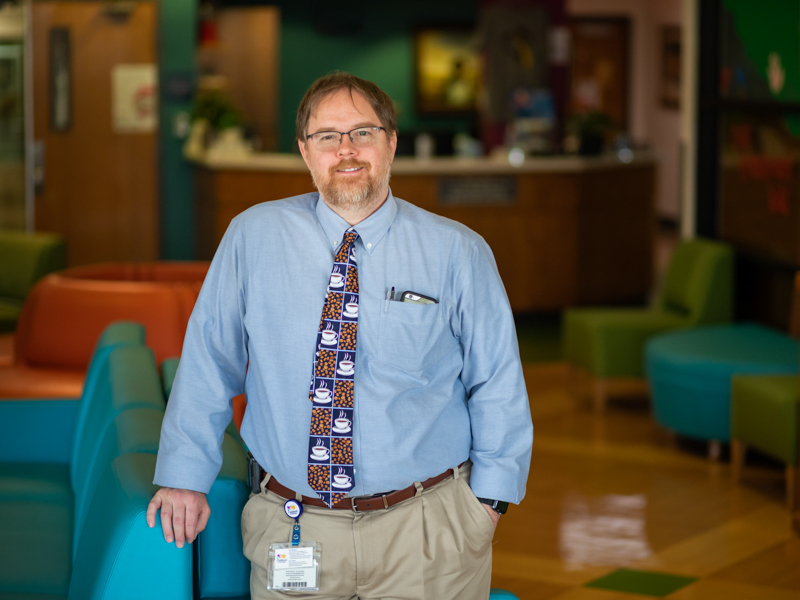Q&A: Dr. Anderson Collier

Note: This article originally appeared in the Spring 2021 issue of Under the Rainbow, the semi-annual magazine for Children's of Mississippi.
Children diagnosed with cancer and blood disorders and their families aren’t fighting these diseases on their own. They have the team of experts at the Children’s of Mississippi Center for Cancer and Blood Disorders in their corner.
On the campus of the state’s only academic medical center and only children’s hospital, the Center for Cancer and Blood Disorders provides treatment for any Mississippi child with cancer, sickle cell anemia or other blood-related diseases.
Physicians, nurses, pharmacists, imaging experts, child life specialists, social workers and other medical team members team up with patients and their family members to fight diseases including bone cancer, brain and central nervous system cancers, germ cell tumors, liver cancer, Hodgkins lymphoma, Langerhans cell histiocytosis, leukemia, neuroblastoma, non-Hodgkin’s lymphoma, cancer of the eye, soft-tissue cancer and kidney cancer.
Dr. Anderson Collier, director of Mississippi’s only cancer and blood disorders center designed for children, shares insights into the latest medical discoveries that are leading to cures.
How often are children in Mississippi diagnosed with cancer or a blood disorder, such as sickle cell anemia?
There are approximately 90 children under 16 years old diagnosed with cancer in Mississippi per year, or on average, about one new diagnosis every four days. If you extend the age to 18 and younger per year, there are approximately 140 new diagnoses per year.
In Mississippi, about 80 babies are born with some form of sickle cell anemia each year.
A young child being sick with cancer is especially tragic. What are we learning today about childhood cancer that may have been unknown just a few short years ago?
I describe conventional chemotherapy to parents as medications used to kill cells that grow fast.
The new medications and therapies that have been and are currently being developed are more targeted. We are learning about the cellular mechanisms that allow certain types of cancer to grow and develop and are designing medications to target those mechanisms. These targeted therapies are much more specific to the cancer and potentially have fewer side effects.
We are also currently using and studying additional immunotherapies. These therapies use a person’s own immune system to attack the cancer cells.
Tell us more about the care offered to children and their families at the Children’s of Mississippi Center for Cancer and Blood Disorders.
A diagnosis and treatment of childhood cancer or sickle cell anemia is very difficult on the child and the family.
At Children’s of Mississippi’s Center for Cancer and Blood Disorders, we can offer access to clinical trials of novel medications for both cancer and sickle cell anemia. We will usually have 30 to 50 cancer trials open and up to 12 trials for sickle cell anemia.
In addition to the care, we also have a hospital school teacher, Kathy Rankin, who teaches the children in coordination with the patients’ schools. Pediatric psychologist Dr. Cynthia Karlson provides psychological treatment to the patients and performs neurocognitive testing to diagnose any learning or developmental issues.
Social workers Jennifer Smith and Rachel King do more tasks for the patients and their families than I can list. With these staff members and our dedicated nurses, pharmacists, nurse practitioners and physicians, we attempt to meet all the needs of the patients and their families.
Are there areas of research into cancer and blood disorders that are particularly promising?
Targeted agents and immunotherapies are the most exciting areas of childhood cancer research currently. In terms of sickle cell anemia, we have been using the disease-modifying agent hydroxyurea, for more than a decade. In fact, our center was part of the original trial of this medication in children.
Perhaps the most exciting area is gene therapy for sickle cell anemia. We hope to have a trial of this therapy open at the Center for Cancer and Blood Disorders soon.
Renovations of the Center for Cancer and Blood Disorders are coming, thanks to a fund started with a $1.5 million gift from Pat and Jim Coggin. Tell us more!
We are so grateful to Pat and Jim Coggin for their generosity. Their gift will help us add additional clinic space and a larger infusion area that will have more privacy for patients and their families.
The infusion room, where children receive chemotherapy and blood transfusions, will be enlarged to allow for social distancing and to make space for semi-private areas.
Also in the plans are additional clinic rooms, pharmacy upgrades and an administrative space for faculty and staff, which will enhance collaboration among providers, professors, students, residents and fellows.


